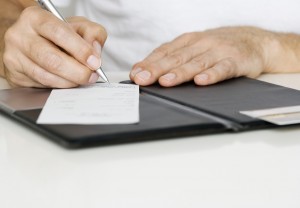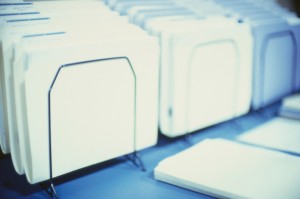How to Organize Your Finances – Part I
 Paying bills is never an enjoyable task (except when they are all paid and you feel caught up) but having your paperwork, bills, and other items in complete disarray will only complicate matters. Simple and easy organizational tools will help you keep everything together and spend less time looking for thing when it’s time to pay bills.
Paying bills is never an enjoyable task (except when they are all paid and you feel caught up) but having your paperwork, bills, and other items in complete disarray will only complicate matters. Simple and easy organizational tools will help you keep everything together and spend less time looking for thing when it’s time to pay bills.
The Bill Binder
I keep a binder right on the counter in my kitchen. In that binder, I have a couple of sleeves with pockets as well as some loose leaf paper. Anytime I get a bill, I put it right into the sleeve labeled “bill.” I have another sleeve for “taxes” and a third one for “receipts.” Anytime I have something come in the mail that is applicable to taxes for the year, like a deduction receipt, my W-2 for work, or anything else that I may want to save it goes in the taxes file. The receipts sleeve is a little different. I have envelopes in there to organize receipts of gift purchases. They are labeled “Christmas 2008” or “Rachel Birthday” and kept separate. I keep the envelopes as general as possible so I can reuse them the following year. I also keep receipts from general shopping – groceries, clothing purchases, items for the house – all in an envelope as well just in case I have to return something.
The binder also has some loose leaf paper in it that I record things like bill schedules, account numbers, phone numbers of utility companies, etc. I keep all of this in one place for easy access. For security, I don’t write out full credit card numbers on this sheet. I keep any credit card numbers in another place in case my home is ever broken into. But I still record the payment due dates and main contact phone numbers in that binder. I use it as a checklist every month as I am paying bills to make sure I didn’t skip or miss anything.
Set a Bill Paying Schedule
If you can afford to do direct withdrawals from your checking account to pay your bills each month, that is probably the easiest way to take care of payments and not be late and have to pay late fees. If you cannot do that or you are just not comfortable with it, I recommend setting up a schedule to pay your bills.
I divide my bills into two groups – bills that are due between the 3rd and the 17th of each month and bills that are due between the 18th and the 2nd of the next month. On the first of each month, I sit down and pay all the bills in the first group. On the 15th of each month, I pay all the bills in the second group. This system works well for me and my family. Set up a schedule that works for you. Perhaps you need to sit down three times a month and take care of bills. Or maybe it needs to happen every Tuesday. Whatever you need to do, just be sure to set it up and then follow through.
Keep your Paperwork Together & Organized
When I pay a bill, I take the invoice that is left and just put a note that says “paid” and what date I paid it. If I used a check, I’ll jot down the check number as well. Then I file it. I am waiting for a filing cabinet, but in the meantime I am using a simple box to keep my file folders organized. I label the folder with the company or service for each set of bills. For instance, my folders say “Honda” or “water bills.” I try and keep this as simple as possible.
used a check, I’ll jot down the check number as well. Then I file it. I am waiting for a filing cabinet, but in the meantime I am using a simple box to keep my file folders organized. I label the folder with the company or service for each set of bills. For instance, my folders say “Honda” or “water bills.” I try and keep this as simple as possible.
I also include files for my 401k, big purchases, home improvement documents, and bank statements. I also keep my personal and business financial paperwork separate. Ideally, these go in separate drawers in a filing cabinet or another file box entirely.
The next big question becomes “How long do I keep bills that are paid?” Here are my general rules of thumb:
- Taxes – 7 years at least
- Paid Bills – at least one year; 7 years if the bills are related to taxes
- Receipts for large purchases – Permanently or as long as I own the item (washing machine, new windows for the home, expensive jewelry, etc)
- Paycheck stubs – at least one year (until my W-2 arrives)
- Bank Records – at least one year
Every year when we have completed our taxes, I celebrate by cleaning out these files and sending the documents through the shredder.
Stick With the Plan
Whether you take these ideas or come up with a system of your own, the key to keeping your finances organized is to stay consistent. As soon as the bill comes in, put it in your Bill Binder or whatever system you have created. As soon as it is paid, put it in the appropriate location. Keep to your bill paying schedule. Little things make a big difference and staying consistent will eliminate a lot of headaches when it comes time to pay your bills or do you taxes.